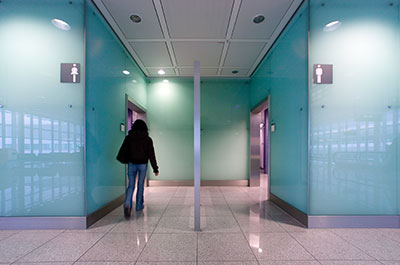Most of us don’t give any thought to our bladders—until there’s a problem. Overactive bladder, incontinence, recurring urinary tract infections and having to pee several times a night are issues that can affect both men and women.
But the good news is there are actually lots of things you can do now to keep your bladder healthy in the long term. “Healthy bladder habits can go a long way toward preventing—and even treating—some types of bladder problems,” says Samantha Raffee, M.D., a urologist at Henry Ford Health.
The Most Common Bladder Health Problems
We often associate bladder issues with getting older. But bladder problems are not an inevitable fact of aging—and they can affect people of all ages. Some of the most common bladder problems that can happen at any age include:
- Overactive bladder: “This condition is very prevalent,” says Dr. Raffee. “Up to 30% or 40% of adults live with overactive bladder.” Someone with overactive bladder typically experiences a very urgent desire to go and/or the need to go frequently.
- Nocturia: It’s not uncommon to wake once (or even twice) to pee in the middle of the night. But if you find yourself going more than that most nights, there may be a problem.
- Incontinence: Urinary incontinence can mean leaking just a drop or two of urine when you cough, sneeze or jump. It can also exist in tandem with urgency. You could have such an urgent need to pee that you can’t hold it long enough to get to the bathroom.
- Recurrent infections: By definition, this means you get two or more bladder or urinary tract infections in six months (or three in one year).
How To Eat And Drink For Better Bladder Health
Your diet can have a big impact on the health of your bladder. Altering your diet to optimize bladder health is as simple as:

Meet With A Urologist
- Staying well hydrated: “Not hydrating enough is a big risk factor for bladder problems,” says Dr. Raffee. She recommends drinking half your body weight in ounces each day. For example, for a 150-pound person, that means 75 ounces of water or other non-alcoholic, non-caffeinated beverages.
- Avoiding bladder irritants: Certain foods and drinks are known to irritate the bladder, making you more likely to experience urgency or frequency issues. Things to avoid include: caffeinated beverages, carbonated beverages, citrus fruits and juices and spicy foods.
- Cutting down on alcohol: Alcoholic beverages are a diuretic. That means they increase the amount of water you lose every time you pee. Not only can this lead to dehydration, it can also increase your frequency and urgency to pee.
- Tapering your fluids in the evening: If you find yourself getting up to go too many times during the night, Dr. Raffee recommends cutting yourself off from fluids three hours before bedtime.
Bathroom Habits That Help Your Bladder
When it comes to taking care of your bladder, paying attention to how often and how much you pee is important.
“Holding urine for too long is bad for your bladder,” says Dr. Raffee, “especially if it becomes a habit. When you routinely wait too long to pee, it can damage small nerves around your bladder that are responsible for sensation. Over time, this can make it more difficult to sense when you need to go.
“Holding a full bladder can also increase your risk of a bladder infection,” says Dr. Raffee. On average, you should pee every two to three hours. “If you are only going two or three times all day, you are either dehydrated or holding for too long,” she says. Not emptying your bladder fully each time you pee also increases your risk of an infection.
The Importance Of A Healthy Pelvic Floor
“The muscles of the pelvic floor are our foundation,” says Dr. Raffee. “They not only support our pelvic organs, but also help with other aspects of bladder health.”
Pelvic floor health goes beyond just Kegel exercises (although strengthening those muscles can help with urine leakage). Dr. Raffee notes that most people could benefit from sessions with a certified pelvic floor physical therapist. “They can teach you to relax the pelvic floor, urge-suppression techniques and more ways to help prevent or treat overactive bladder and incontinence,” she says.
When To See Your Doctor
If you are having issues with urgency, frequency, incontinence or infections, talk to your doctor. “If any of these symptoms become bothersome or they are causing you to alter your lifestyle, seek help,” says Dr. Raffee. When lifestyle changes alone aren’t enough, your doctor can offer a range of treatments to effectively manage all types of bladder problems.
Reviewed by Samantha Raffee, M.D., a urologist who sees patients at Henry Ford Hospital in Detroit, Henry Ford Medical Center - Lakeside and Henry Ford Medical Center - Bloomfield Township.


